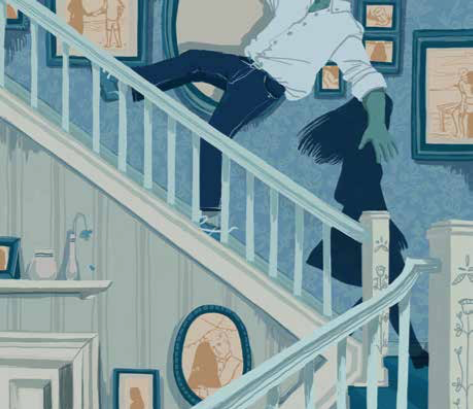
When Men Are Left…
Why Not Let Them Mourn the Breakup?

ART: JENSINE ECKWALL
“If you are a man who has been left by your wife or significant other, I would like to interview you for a book I am writing on men and breakups.” To recruit participants for my research, I put up signs in cities and towns in Israel and the United States. I was surprised both by the number of men who responded and by the fervor they expressed in telling their stories.
The men were Israelis of European, Turkish, Australian, and North African descent; Americans of Vietnamese, Indian, and South American descent. They were gardeners, hairdressers, clergymen, teachers, doctors, lawyers, army officers, police officers, a manicurist and a high-school principal. Almost without exception, these men of widely divergent backgrounds told the same story: their breakup was a crushing blow, and for many of them it came as a shocking surprise: “In that moment, my life ended” (Joel); “Who was I going to bed with every night for 18 years? Where was I? Who was I?” (Kobi); “I thought we were a family. I didn’t know who I was” (Bruce); “People say to me, didn’t you see all the past years what was going on? I feel so stupid” (Bob). (Their names have been changed.)
The men’s surprise is itself surprising, in the wake of recent research on boys. Both Judy Chu (When Boys Become Boys: Development, Relationships, and Masculinity) and Niobe Way (Deep Secrets: Boys’ Friendships and the Crisis of Connection) show that boys are extremely perceptive in picking up on emotional cues from the people around them, and yet here were grown men who evidently were blindsided by the emotional lives of the women they loved.
Many of the men experienced a “double bind of masculinity.” As “real men,” they’d had to earn sufficient income to provide for their families, but for many this entailed long hours of work, leaving them exhausted, irritable, and unavailable physically and emotionally—factors that often led to their being left. Ironically, it was precisely their obedi- ence to the dictates of hegemonic masculinity that contributed to the public undermining of their manliness.
The book I’m working on that grew out of my research, When Men Are Left: Love, Loss, and Manhood, overturns the conventional assumption that men who are left feel free, something like “Wow, the whole world is now open to me.” Simon, for example, a 42-year-old law professor and media figure, said that his breakup “felt the same way as when my father died. Any little thing was so difficult for me.” Joel, a retired Israeli army commando, compared his breakup to an earlier trauma, when he witnessed a friend killed in battle. Scott, a 45-year-old intelligence officer in the U.S. army who had recently returned from active duty and re-enrolled in col- lege, described a “horrible crushing collapse of ego and will,” from which “you never recover…you just deal with it. You never really heal.” Arnie, a 50-year-old businessman, stated flatly: “I died. I am alive and died and stayed alive—dead and alive at the same time.”
More striking than the men’s press- ing need, even years later, to speak about their breakups and to mourn, was the need to unpack the harsh social expectations and demands they felt were placed on them—especially the constant urging to “move on.” If a man does not move on, it seems, he risks being brand- ed a failure both for the dissolution of his relationship and also for not getting over it quickly enough. In interview after interview, I heard from men who were invested in their lost relationships and who had been connected and committed to marriage and family. They resisted socially imposed definitions of what breakups “should” mean to them.
It turns out that to these men’s ears, “move on” sounds not like supportive advice but intense pressure, with an underlying note of suspicion: What flaw in your character is preventing you from moving on? Whatever it is, maybe it’s why she left you to begin with? The men resisted and did not move on—that is, not until they in effect could explain to themselves their own surprise at being left.
Observe the shock and bewilderment in these remarks by Bruce, a 55-year-old physician. Bruce was informed by his wife of 25 years that she was leaving him for his business partner, with whom (she informed him now for the first time) she had been having an affair for the past five years. Bruce said: “I thought we were working on our relationship. I thought we were a family. I didn’t know who I was.” Men like Bruce were willing to put their masculinity on the line and risk public shaming by staying with what they feel, not quickly “moving on,” in order solve the riddle: How could this happen to me?
At a certain point, men who have been left will stop talking about their breakups; they will retreat and turn increasingly inward, adopting a strategy of silence. After a while, when asked how they’re coping with the breakup, the men will say “fine,” and change the subject. Joel described a brief arc in which “at first people were nice and I would talk about my feelings, but then they lost patience and said, ‘Cut the story already. See it as a sign, make a clean break. Go on, take responsibility for your life. You’re projecting weakness to your girls’.” Sanjay, an Indian diplomat in his early 60s, reported that when he disclosed his inner trauma to a friend, “He answered me in such a flippant way that I never said anything to anyone ever again.”
In many ways, the situation of men who have been left calls to mind Carol Gilligan’s analysis of the plight of adolescent girls, who are also forced to choose between what they feel and know and what they are expected by society to feel. Gilligan often quotes Iris, a high school senior, who told her: “If I were to say what I was feeling and thinking, no one would want to be with me. My voice would be too loud.” Iris then added: “But you have to have relationships.” Iris felt that she had to go out of relationship with herself in order to have relationships with others.
I heard this same struggle echoed again and again in the narratives of the men I interviewed. They all were made aware of the price to be paid for speaking what they really feel. At best, they were refused an audience, when even those closest to them did not want to listen to their pain, and at worst their manhood was questioned when they revealed the depth of their wounds. In order for the men to be in relation with their society, they had to keep a “stiff upper lip” and pretend that they had successfully and quickly gotten over the breakup.
What I came to understand is that the men’s pretense exacted its own terrible cost by exacerbating their pain and suffering. Release from their suffering was not usually available to the men I interviewed. The sad paradox at the heart of Paul’s story demonstrates this with painful clarity. After his wife left him, and in the absence of empathy from friends and family, Paul became addicted to cocaine. He sought help for his addiction by attending Narcotics Anonymous meetings. It was only there, he said, at Narcotics Anonymous—with its sanctioned context for revealing personal matters—that he was able to speak openly about his feelings in the wake of his breakup.
For a man recovering from this kind of loss, it turns out that holding on to pain and brokenness may point the way forward. It is far more effective, and potentially transformative, to acknowledge the enormity of what has hap- pened to him—that he has lost the most important person in his life; that his past, present and future have become, at least temporarily, totally incoherent to him—than it is to heed the voices urging him to hurry up and “get over it.” John, for example is now remarried and has a wonderful relationship with his new wife, Susan. And yet John will occasionally look at photo albums from his years with his previous family. When Susan asks him “Why do you need to do this?” he answers: “This is part of who I am. Because I’m real about my loss, I can be real with you.” John may be one of the fortunate ones who can, at least now, speak freely about his feelings.
In general, women have more scope in how society allows us to express feelings of pain, rejection, and trauma. And whereas some men feel, as Joel did, that his friends and family expected him to “move on” after an extremely short period of time (“I felt they were saying, ‘This is too messy. It’s already three weeks, enough’.”), women are allowed to mourn for months after a breakup. But the crucial difference between society’s expectations of men and women concerns not the difference in the socially acceptable mourning period, but in how society relates to those who exceed their allotted time. Women who tarry are seen as pathetic, but are still consid- ered women; if men, on the other hand, continue to show signs that they’re in mourning and are not “letting go,” they are no longer men. The wonder is that many men are willing to put their masculinity at risk by not moving on. Indeed, when we listen carefully and empathetically to men who have been left, more often than not we discover (and can respect) men who resist acting as if a beloved romantic partner can be replaced as easily as an old car.
Tova Hartman is the author of Are You Not a Man of God?: Devotion, Betrayal, and Social Criticism in Jewish Tradition; Feminism Encounters Jewish Tradition: Resistance and Accommodation; and Appropriately Subversive: Modern Mothers in Traditional Religions.



